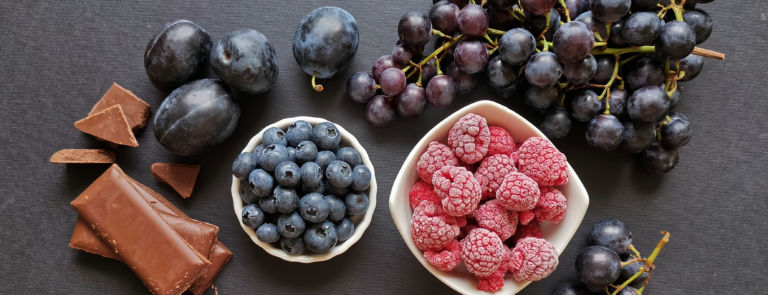15% off €35 OR 20% off €45
Code:CHOOSE
Resveratrol benefits: What’s the science behind the hype?

Is there evidence to support resveratrol benefits? Could a daily glass of red wine really help you live longer? We look at the science behind the headlines.
Could a daily glass of red wine really help you live longer? In recent decades a glass of shiraz has been credited with everything from protecting against heart disease to preventing obesity. These health claims are down to red wine’s resveratrol content. But is there any science to support resveratrol benefits? And is red wine really the best source?
What is resveratrol?
Resveratrol is a natural polyphenol. This is a micronutrient found in more than 70 plant species.1 Many of these are foods we routinely include in our diets. Alternatively, you can get a more concentrated dose from a resveratrol supplement.2 And if you’re wondering how to pronounce it – it's rez-vair-a-trawl.
Resveratrol vs trans resveratrol
Have you spotted references to ‘trans resveratrol’ thrown into the mix too? You may be wondering if they’re the same thing. Resveratrol is the general product name used for supplements. But the active ingredient contained within is often trans resveratrol. They are two different forms of the compound. The distinction between the two types comes down to how easy it is for your body to absorb and use it. Here’s the breakdown:3
- Red grape skins are a rich source of resveratrol. However, the health benefits only occur once it’s converted into trans resveratrol in the body.
- Trans resveratrol is a chemical form of resveratrol that’s ready to be absorbed and used by the body. For example, Japanese knotweed contains high concentrations of trans resveratrol. This makes it an effective source for supplements.
7 resveratrol foods
Resveratrol supplements are a convenient way to get your full dose of resveratrol. However, it’s widely available in food sources too.4
1. Fresh grapes
- The skins and seeds of this fruit provide a rich, natural supply. Snacking on fresh grapes is a great way of getting a healthy dose of vine-sourced resveratrol.
- The resveratrol content in grape skins survives fermentation. But due to the alcohol content, the resveratrol from red wine comes with some health trade-offs.
- If you’re looking for another drinkable source, grape juice is an alternative. It may be alcohol-free, but grape juices often contain lots of sugar.
- The resveratrol content of peanuts is comparable to most red wines.5

5. Pistachio
- Pistachio is another nut source. In fact, it contains more of the nutrient than peanuts.6
- Hidden within the dark squares is some of this plant-derived compound. But beware, the butter content also adds fat-filled calories. A raw cocoa powder (or cacao) offers similar benefits, but with a lower calorie content.
7. Berries
- Strawberries, blueberries, mulberries, cranberries and lingonberries are all sources.
3 health benefits of resveratrol
With the growing scientific interest in resveratrol, a long list of health benefits is emerging. And beyond the hype and headlines, there’s potential for this ingredient to support many aspects of your wellness. Here are three examples
- Support for cardiovascular health
Resveratrol can help dilate blood vessels.7 This is down to the polyphenol’s role in increasing the production of nitric oxide. This causes blood vessels to relax.8 There’s also evidence it may reduce LDL cholesterol (the ‘bad’ type) and therefore reduce the likelihood of blood clots. The combined impact could be to protect against cholesterol build-up.9 - Fighting off the effects of oxygen free radicals
Oxidative stress happens due to a disparity between free radicals and antioxidants in your body. Free radicals are oxygen-containing molecules that can cause chain chemical reactions in your body called oxidation. Over time, this can cause damage to fatty tissue, DNA, and proteins, and may contribute to a whole range of health conditions. Antioxidants stabilise free radicals which makes them less reactive.10 Resveratrol provides a potent dose of antioxidants that helps to keep oxygen free radicals in check. This can reduce the damage caused by oxidative stress.11 - Mimics the effects of low-calorie intake
A study in 2012 suggested the action of resveratrol mimics a calorie-restricted diet.12 As part of the research, scientists gave resveratrol supplements to a group of obese men. It uncovered that the compound provoked metabolic effects that are similar to those from exercise and calorie restriction.
Does resveratrol help you lose weight?
There's no shortage of research investigating the connection between resveratrol and weight loss. But it's primarily based on animals. And although there’s evidence to support the metabolic benefits of resveratrol,13 claims it helps people lose weight are less robustly supported. In fact, your chosen resveratrol source could have an unfavourable impact on your calorie intake. For example, red wine provides a relatively low dose of the micronutrient but comes with a high calorie count. If weight management is a concern for you, a supplement source may be favourable.
What are the side effects of resveratrol?
There are no major risks connected to resveratrol. However, in the higher doses in resveratrol supplements, there are potential side effects.14
- Impact on oestrogen activity.15 Resveratrol is chemically related to oestrogen. If exposure to oestrogen could affect you, seek medical advice before taking resveratrol supplements. This includes women with certain cancers (e.g. breast, ovary, uterus), those trying to become pregnant, or those taking an oral contraceptive.16
- Slower blood clotting. For people with bleeding disorders, resveratrol can increase the risk of bleeding. This is relevant if you’re taking blood thinners such as warfarin, aspirin and ibuprofen.17 Or if you are due to have surgery.
Summary: Does resveratrol really work?
The research on resveratrol benefits is promising. The antioxidant and anti-inflammatory potential of this plant compound support connections to wide-ranging health benefits. As more human-based research emerges, we will hopefully learn more about the optimum resveratrol dosage and how exactly it impacts on our bodies.
The advice in this article is for information only and should not replace medical care. Please check with your GP or healthcare professional before trying any supplements, treatments or remedies. Food supplements must not be used as a substitute for a varied and balanced diet and a healthy lifestyle.
Last updated: 26 November 2020
- https://www.ncbi.nlm.nih.gov/pmc/articles/PMC6164842/
- https://vitalplan.com/ingredients/resveratrol
- https://www.health.harvard.edu/blog/resveratrol-the-hype-continues-201202034189
- https://www.superfoodly.com/resveratrol-foods-supplements/
- https://www.superfoodly.com/resveratrol-foods-supplements/
- https://www.health.harvard.edu/blog/resveratrol-the-hype-continues-201202034189
- https://pubmed.ncbi.nlm.nih.gov/25302702/
- https://www.mayoclinic.org/diseases-conditions/heart-disease/in-depth/red-wine/art-20048281
- https://www.sciencedirect.com/science/article/pii/S1878535210001012
- https://www.healthline.com/health/oxidative-stress
- https://www.sciencedirect.com/science/article/pii/S1878535210001012
- https://www.ncbi.nlm.nih.gov/pmc/articles/PMC3462230/
- https://www.ncbi.nlm.nih.gov/pmc/articles/PMC3462230/
- https://www.health.harvard.edu/blog/resveratrol-the-hype-continues-201202034189
- https://www.healthline.com/nutrition/resveratrol
- https://www.webmd.com/vitamins/ai/ingredientmono-307/resveratrol
- https://www.verywellfit.com/benefits-of-resveratrol-89581



